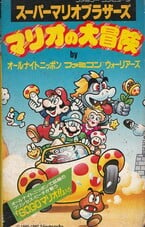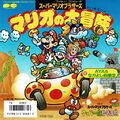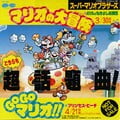Mario no Daibōken: Difference between revisions
Nintenboi1 (talk | contribs) No edit summary |
mNo edit summary |
||
| (20 intermediate revisions by 5 users not shown) | |||
| Line 1: | Line 1: | ||
{{italic title|''Mario no Daibōken''}} | {{italic title|''Mario no Daibōken''}} | ||
[[ | {{about|the Japan-exclusive strategy guide video tape for ''[[Super Mario Bros.]]''|its associated vinyl record single featuring two exclusive songs|[[Mario no Daibōken (album)]]|the serialized [[Nintendo Power]] comic also known as ''Mario no Daibōken'' in Japan|[[Super Mario Adventures]]}} | ||
{{multiple image | |||
|footer=Covers for the VHS (left) and Betamax (right) release of ''Mario no Daibōken''. | |||
|image1=Mario no Daibouken VHS.jpg | |||
|alt1==Cover for the VHS release of ''Mario no Daibōken''. | |||
|width1=120 | |||
|image2=Mario no Daibouken Betamax.jpg | |||
|alt2==Cover for the Betamax release of ''Mario no Daibōken''. | |||
|width2=145 | |||
}} | |||
'''''Mario no Daibōken''''' (Japanese: マリオの大冒険, lit: ''Mario's Great Adventure'') is an obscure VHS and Betamax strategy guide released in Japan in 1986 by {{wp|Pony Canyon}} for ''[[Super Mario Bros.]]'' It features tips for various [[level]]s, live-action segments starring a [[Mario]] mascot costume, and ''[[Ground Theme (Super Mario Bros.)#Mario no Daibōken|GO GO Mario!!]]'', a lyrical version of the game's Ground Theme. ''GO GO Mario!!'' would later be released as a single in Japan. | |||
The video guides the viewer through a quick playthrough of ''Super Mario Bros.'', starting in [[World 1-1 (Super Mario Bros.)|World 1-1]], using the [[Warp Zone]] in [[World 1-2 (Super Mario Bros.)|World 1-2]] to warp to World 4, and using [[World 4-2 (Super Mario Bros.)|World 4-2]]'s Warp Zone to warp to World 8 and complete the game. | The video guides the viewer through a quick playthrough of ''Super Mario Bros.'', starting in [[World 1-1 (Super Mario Bros.)|World 1-1]], using the [[Warp Zone]] in [[World 1-2 (Super Mario Bros.)|World 1-2]] to warp to World 4, and using [[World 4-2 (Super Mario Bros.)|World 4-2]]'s Warp Zone to warp to World 8 and complete the game. | ||
The video also shows a variety of secrets such as the aforementioned Warp Zones in World 1-2 and | The video also shows a variety of secrets, such as the aforementioned Warp Zones in World 1-2 and World 4-2, various hidden 1-Up locations, and the infinite 1-Up trick in [[World 3-1 (Super Mario Bros.)|World 3-1]]. The video contains a rare instance of [[Nintendo]] officially showcasing and endorsing the use of [[glitch]]es in its games, featuring a segment all about various bugs present in the game. | ||
[[File:MarioDaibokenMascot.jpg|thumb|left|The Mario mascot costume]] | |||
All of this is regularly interrupted by live-action segments featuring a Mario mascot costume who can be seen playing the game. Mario introduces new segments and gives commentary, and he plays a prominent role in the ''GO GO Mario!!'' music video shown at the end of the VHS. | |||
A vinyl single for this video, also entitled ''[[Mario no Daibōken (album)|Mario no Daibōken]]'', was released on March 30, 1986, but neither of the two songs featured on the record (''Mario no Daibōken'' and ''Kuppa Ichizoku Kazoe-uta'') were featured in the actual video. The single had an exclusive promotional version titled ''[[Mario no Daibōken/GO GO Mario!!]]'', which replaced ''Kuppa Ichizoku Kazoe-uta'' with ''GO GO Mario!!'' | |||
{{br}} __NOTOC__ | |||
==Gallery== | |||
<gallery> | |||
Mario no Daibouken single cover.jpg|''[[Mario no Daibōken (album)|Mario no Daibōken]]'' vinyl record single | |||
Mario no Daiboken and GO GO Mario single.jpg|''[[Mario no Daibōken/GO GO Mario!!]]'' vinyl record single | |||
Mario no Daibouken cassette.jpg|''Mario no Daibōken'' cassette tape single | |||
GO GO Mario!! cassette.jpg|''GO GO Mario!!'' cassette tape single | |||
</gallery> | |||
==Trivia== | |||
*The art featured on the covers for both the video and the record would later be repurposed and modified to serve as the box art for ''[[All Night Nippon: Super Mario Bros.]]''<ref>[https://twitter.com/kikaim/status/1294964623657992193/photo/1 kikai / マリオが好きなひと on X]</ref> | |||
==External links== | |||
*[https://youtu.be/Nc0SmBtjiG4?si=23nF3FvATR90y6vV The full video] | |||
==References== | |||
<references/> | |||
{{TV series and films}} | {{TV series and films}} | ||
[[Category: | [[Category:VHSes]] | ||
Latest revision as of 10:57, June 22, 2024
- This article is about the Japan-exclusive strategy guide video tape for Super Mario Bros. For its associated vinyl record single featuring two exclusive songs, see Mario no Daibōken (album). For the serialized Nintendo Power comic also known as Mario no Daibōken in Japan, see Super Mario Adventures.
Mario no Daibōken (Japanese: マリオの大冒険, lit: Mario's Great Adventure) is an obscure VHS and Betamax strategy guide released in Japan in 1986 by Pony Canyon for Super Mario Bros. It features tips for various levels, live-action segments starring a Mario mascot costume, and GO GO Mario!!, a lyrical version of the game's Ground Theme. GO GO Mario!! would later be released as a single in Japan.
The video guides the viewer through a quick playthrough of Super Mario Bros., starting in World 1-1, using the Warp Zone in World 1-2 to warp to World 4, and using World 4-2's Warp Zone to warp to World 8 and complete the game.
The video also shows a variety of secrets, such as the aforementioned Warp Zones in World 1-2 and World 4-2, various hidden 1-Up locations, and the infinite 1-Up trick in World 3-1. The video contains a rare instance of Nintendo officially showcasing and endorsing the use of glitches in its games, featuring a segment all about various bugs present in the game.
All of this is regularly interrupted by live-action segments featuring a Mario mascot costume who can be seen playing the game. Mario introduces new segments and gives commentary, and he plays a prominent role in the GO GO Mario!! music video shown at the end of the VHS.
A vinyl single for this video, also entitled Mario no Daibōken, was released on March 30, 1986, but neither of the two songs featured on the record (Mario no Daibōken and Kuppa Ichizoku Kazoe-uta) were featured in the actual video. The single had an exclusive promotional version titled Mario no Daibōken/GO GO Mario!!, which replaced Kuppa Ichizoku Kazoe-uta with GO GO Mario!!
Gallery[edit]
Mario no Daibōken vinyl record single
Mario no Daibōken/GO GO Mario!! vinyl record single
Trivia[edit]
- The art featured on the covers for both the video and the record would later be repurposed and modified to serve as the box art for All Night Nippon: Super Mario Bros.[1]






